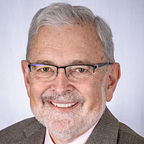Joseph Dingman: Developing Affordable Housing at 79
“Retirement is a fraud perpetrated on the public. It’s shameful to waste people who are 65 to go play golf or watch TV. I don’t even understand it. I have my time to give, and as long as my wife doesn’t need something from me, what else am I going to do?”
If retirement is narrowly defined as working for money, Joe Dingman is almost completely retired. However, he continues to work in his main occupation, organizing major real estate development projects in Dallas, Texas, mostly without pay. The difference? In the past, he worked mostly for German pension plans and investors that own real estate in the United States. While he continues to work one day a month for two of those for-profit investors, the rest of his work time is now devoted to developing housing for lower income families, seniors, and the homeless, in Dallas, Texas.
Joe grew up in a tiny German Catholic town in southeastern Iowa, in an extended family of farmers. He earned a Bachelor of Arts degree from Benedictine College in Kansas, then a MBA from Marquette University in Wisconsin. After various corporate finance and planning roles, in 1982 he went to work for a firm that provided real estate investment management for large pension plans. In 1998 he left that firm to establish his own business, Orion Realty Advisors. “I’ve always been a guy who could easily see what’s right and wrong, and I’ve never had the flexibility to ignore what’s wrong, so we weren’t getting along that well. They terminated my employment, which meant they had to pay me a ton of money and give me the German clients of the firm.” Over two decades later, Joe continues to work about one day a month with two of these German investors, managing their US real estate holdings. “I don’t need the income, but I don’t want to fire old clients, and they don’t want to fire me.”
In 1991 Joe and three other individuals founded a non-profit, the Catholic Housing Initiative. CHI provides housing for less advantaged people throughout the Dallas area. He and the other founders would meet in the evenings, so as not to take time away from their day job responsibilities. Over the years, as his personal need to earn a living decreased, Joe transitioned more and more to the non-profit side. Today he focuses on the non-profit work. Joe recently completed a complex $45 million transaction involving philanthropy, debt, city, and tax credit money, that will redevelop an area south of downtown Dallas with mixed income housing. He plans to develop another of these complex, high impact transactions every two years for as long as his health allows. His fear is that he will get part way through a major project and not be able to complete it. CHI now has its first full time executive director, rather than relying completely on Joe’s abilities, which is a first step towards mitigating that succession concern.
I sense, if health is the only limiting factor, Joe has many projects to go. As he approaches his 80th year, he appears intellectually alive and completely in possession of his faculties. He remains focused on his unique strengths, and aware of his limitations. I expect the citizens of Dallas will continue to benefit from Joe’s ability to shepherd complex redevelopment projects from inception to completion for decades to come.
In 2020 Joe was honored by the Catholic Foundation in Dallas. Here is the Foundation’s video that documents Joe’s impact for good:
https://www.youtube.com/watch?v=m169EMpdxN0
Joe reports “You don’t know what my motivation is, and sometimes I don’t either. I think I’m motivated in equal parts of just plain liking to achieve vs. I like the outcome. Feeling good about outcome implies a whole basketful of benefits, recognition being one. It gives me pleasure to see [housing] getting built.”
Towards the end of his life management expert Peter Drucker became interested in the idea of successful executives transitioning to non-profit work in retirement. Mr. Drucker found, to his surprise, that very few did so, unless they were involved in philanthropy while they were still working in their for-profit careers. Joe exemplifies that sort of lifelong motivation and transition.
If you feel stirrings of what may be the beginning of a career transition like Joe’s, here are a couple of books to encourage your thinking that direction:
Managing Oneself, Peter Drucker
Halftime, Bob Buford
We all have unique gifts to offer. Joe has a passion for finance and complex real estate transactions. Those are some of his strengths. What are your strengths? If you are still working full time, what ways could you volunteer your time to express those strengths in your community? It’s okay to start small, part-time, a few hours a month.
Do you know of someone who is working or volunteering past “normal retirement age”? I would love to interview them! Russ@strategicexit.com
